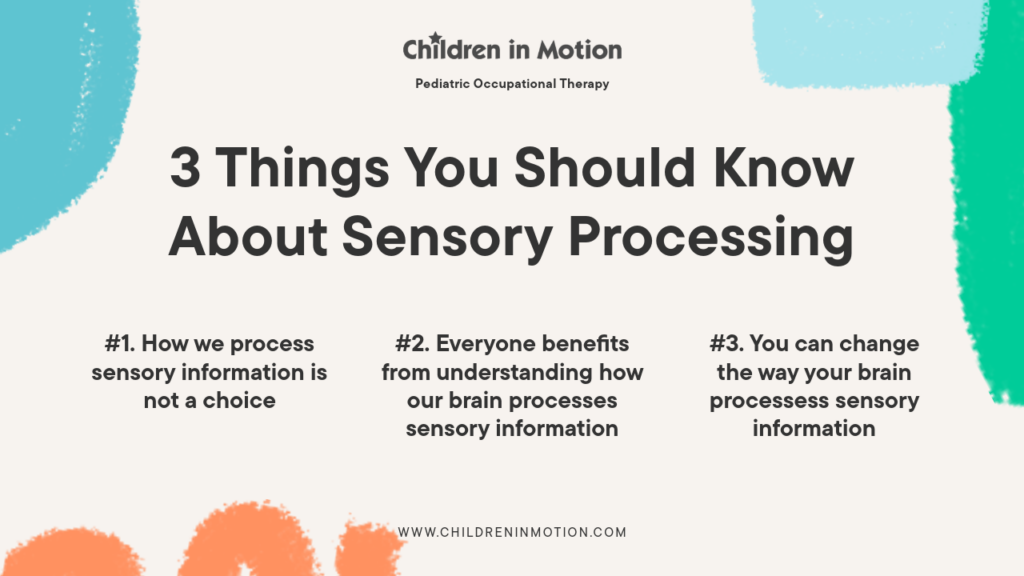3 Things You Should Know About Sensory Processing
Here at Children In Motion we specialize in sensory integration (SI) therapy. Sensory integration utilizes how our brain processes sensory information to help our clients reach their goals. There‘s plenty to learn about sensory, but we believe that there are just 3 things you should know about sensory processing (at the start of your journey) to support your child.
#1. How we process sensory information is not a choice
Alright, so if you are familiar with sensory processing you know that it’s a three step process our brain deploys every time we experience sensory information. First we take in the sensory information (think of the senses – sound, smell, taste, touch, sight), then our brain interprets that information (is it dangerous, do I like it, do I want more), and lastly those interpretations influence the third step which is our reaction to the information (think scream, ignore, get excited).
As logical as that process sounds, it isn’t. It’s neurological. Meaning it happens incredibly, incredibly fast. It’s easy for us to think it’s a slow, deliberate process & that we ultimately choose how our brain processes sensory information. Just think about how much sensory information we are taking in at any given moment. As you sit reading this post, what feelings, smells, sounds, tastes are you processing?
When you think about it in terms of survival, back in the day we needed to respond to sensory input at the drop of a hat to survive. Our cue to run away to avoid getting eaten by that sabertooth tiger was hearing a twig snap or seeing a suspicious glimmer. Luckily, we no longer have to worry about getting eaten, but that wiring still exists in our brains.
So, when someone reacts to something in a way that isn’t anticipated or appropriate, don’t take it personal. You never know what is going on in their mind body system, so extend grace & kindness.
#2 Everyone benefits from understanding how our brain processes sensory information
Whether you have a diagnosis or not, it’s important to understand how to support your nervous system. When we are aware of how our bodies process sensory information we can..
- Understand why we do things the way we do
- Advocate for ourselves
- Communicate our needs to others
- Protect ourselves from certain situations
- Maximize our learning
- Be more compassionate, understanding, & supportive of one another
- Set ourselves up for success
Now imagine an entire community built off of that degree of awareness. How incredible would that be?!
#3 You can change the way your brain processes sensory information
I know what you are thinking already – “Wait, you just said that the way we process sensory information is not a choice. How can we change it if it’s not a choice?”. Hear me out – by working with a skilled & experienced occupational therapist, it is possible to change how your child’s brain processes sensory information.
Naturally, as a part of our training as OTs, we know more about child behavior & development than the average person. This knowledge, paired with our clinical experience, enables us to get a really good grasp on what ‘pieces of the puzzle’ are missing or need extra support. We have the tools to take that knowledge and create an environment where our clients are supported & feel comfortable taking risks. We know when to strategically provide more of one sensation, and less of another sensation.
It’s hard to put the methodology behind rewiring the brain’s default processing into words, but basically we as OTs have an immense understanding of how to interpret & communicate with your child’s mind/body system. As nerdy as it sounds, we know how to talk with muscles & ligaments & nerves… & the body attached to them.
So if your family is going through a really hard time sensory wise, there are things you can do to change that. There is hope for you & your child. Things don’t have to be the way they are right now for the rest of your life.
Conclusion
At first exposure, the world of sensory processing can seem quite overwhelming. The more you learn & expose yourself to it though, the less overwhelming it becomes. Need someone to talk to about your child & their struggles? Our door is always open. The best way to get in contact with us is by filling out our contact form.
Want to learn more about sensory processing?
Download our Sensory Crash Course! Developed specifically for parents of elementary aged children, this crash course will provide an easy to understand introduction to sensory processing that you can use to build on as you travers your sensory journey.

Want to know more about sensory processing, self regulation, child development, & more? Our resource library is full of free crash courses, guides, and tools to help you understand more about your child & how you can support them outside of therapy.
Get your free resources!
show me the resources